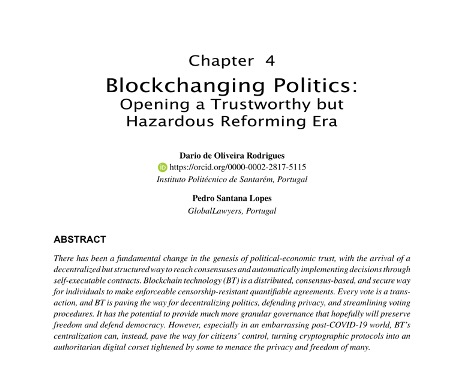“Blockchanging Politics: Opening a Trustworthy but Hazardous Reforming Era”
9 Jul
The fourth chapter of the book “Political and Economic Implications of Blockchain Technology in Business and Healthcare” is political, arguing that digital centralization should not be an option for the free societies in the Blockchain Era. It presents political solutions and recommendations that figuratively are equivalent to a vaccine against the ideological virus of single thought, preventing blockchain technology (BT) of being used in a particularly virulent way. In the authors’ opinion, the worst-case scenario will materialize if law-abiding citizens are prohibited from using private cryptographic keys to protect data’s property and defend their privacy. As discussed throughout the chapter, such personal keys are digital passports to free initiative, privacy, and democracy. They are like “digital masks” protecting citizens against contagions digitally spread along two vectors: social media and digital currencies. These economic media may be used by authoritarian governments, especially when state-based centralized digital currencies are entering the global financial mainstream. It can be the case of Digital Yuan, which is already booming in China. This chapter illustrates the predicted clash between surveillance money and money that sets people free by comparing Digital Yuan and Bitcoin. It is thought that the confrontation between these two types of digital money will be more than a financial dispute in the XXI century, displaying the crucial political dichotomy between open/decentralized and closed/centralized perspectives. Hopefully, advanced cryptographic technologies are paving the way for establishing decentralized and transparent governance models based on community consensuses. As seen in this chapter, public blockchain’s transparency allows more auditable and granular governance models. Thanks to “smart contracts,” digital electoral tokens can make citizens’ will more actionable, being used as votes to scrutinize the government often if there is the freedom necessary to do so. However, unfortunately, instead of giving people a voice, BT can be used to do just the opposite, which should arouse great political concern. Indeed, blockchain protocols can serve society in good and evil ways. Such ambivalence is why this chapter recommends using BT to increase governance transparency, which is considered essential in a Blockchain Era that can be either promising or disruptive.

To access the remaining pages, submit such request through the email address dariooliveirarodrigues@gmail.com. Thanks.
How to cite (APA):
Rodrigues, D. D. & Lopes, P. S. (2021). Blockchanging Politics: Opening a Trustworthy but Hazardous Reforming Era. In D. Rodrigues (Ed.), Political and Economic Implications of Blockchain Technology in Business and Healthcare (pp. 118-159). IGI Global. http://doi:10.4018/978-1-7998-7363-1.ch004
We know that Internet users’ data were made public and handled by Big Tech companies. However, people’s data, including their money, can now be cyphered and managed by either community-based consensuses, third parties, or the state. Hence, political stances regarding digital decentralization will make or break privacy, freedom, and democracy.



No comments yet